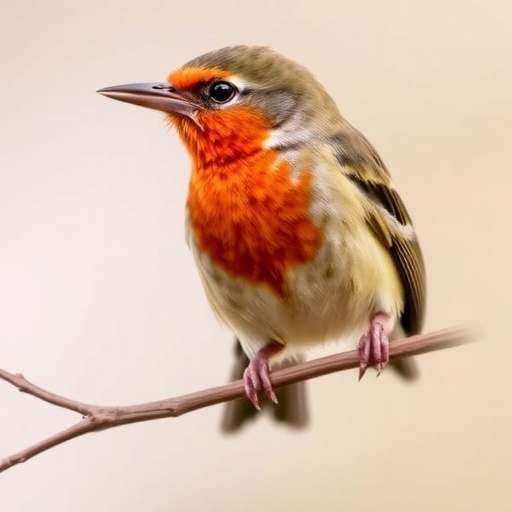In the natural world, the dynamics of familial relationships extend far beyond the human experience, revealing intricate layers of social interaction and learning. A groundbreaking study conducted by researchers at the University of California, Davis, in collaboration with the Max Planck Institute of Animal Behavior, has illuminated the crucial role siblings and non-parental adults play in the cultural transmission of knowledge among juvenile great tits (Parus major), a common European songbird species. This research discloses new dimensions of social learning mechanisms in the wild, particularly under conditions of limited parental care, challenging existing assumptions that parents are the primary educators in the animal kingdom.
The investigation focuses on juvenile great tits, which receive scant parental care—approximately only ten days post-hatching—before fledging and facing the daunting task of survival independently. Such a brief caretaking window naturally constrains the conventional flow of knowledge from parent to offspring, prompting a compelling question: how do these juveniles acquire essential life skills necessary for foraging and shelter-seeking? The answer, as unveiled by the study, lies in the siblings and other adult members within the social environment, who provide alternative and effective pathways for cultural and behavioral inheritance.
Employing an innovative experimental design, the research team introduced automated feeding puzzles to over fifty breeding pairs and their combined 229 fledglings, observing the predators over a ten-week timeframe. These puzzles consisted of sliding doors that, once manipulated correctly, granted access to a hidden tray of mealworms. By microchipping each bird, researchers meticulously tracked individual interactions and learning patterns with a level of granularity previously unattainable in naturalistic settings, producing tens of thousands of discrete behavioral data points.
Geospatial and temporal analyses of the recorded behaviors illuminated a fascinating trend: although juveniles were more likely to solve the puzzle following parental demonstration, the fidelity and consistency of the problem-solving approach were strongly dictated by the influence of siblings and non-parental adult birds. This result signifies a pivotal redefinition of social learning strategies, where the siblings’ role emerges as a dominant conduit for knowledge dissemination post-fledging.
Specifically, among the earliest learners within sibling cohorts, three-quarters acquired puzzle-solving techniques from adults other than their parents, illustrating a substantial reliance on wider social networks beyond immediate family lines. Following this initial learning phase, nearly 94% of the novice learners adopted the puzzle-solving strategies propagated by their siblings, indicating a robust vertical transmission of behaviors within sibling units rather than solely through parental teaching.
This discovery holds profound implications for our understanding of animal culture and its bearings on the evolutionary adaptability and resilience of species. The diversity and multiplicity of cultural models from which juvenile great tits derive information potentially furnish the population with a richer repertoire of survival skills, enabling greater flexibility in response to environmental shifts and ecological pressures.
Moreover, the practical application of these insights transcends academic curiosity, intersecting with contemporary conservation efforts. Recognizing that social learning that incorporates input from multiple social actors can enhance population robustness underscores the importance of preserving complex social structures in wild populations. Strategies aimed at sustaining biodiversity may benefit from fostering environments that allow these nuanced social interactions and exchanges to flourish.
The researchers also underscore a critical re-examination of how limited parental investment influences juvenile development strategies across a broad spectrum of species. Juveniles with abbreviated parental care windows must adapt by engaging more intensively with siblings and community adults, thereby transforming social learning dynamics. Such adaptation exemplifies the evolutionary plasticity of socially transmitted behaviors and raises intriguing questions regarding the genetic and environmental factors driving these pathways.
From a methodological perspective, the study spotlights the advancement of automated data acquisition tools that enable the precise capture of social learning events in wild, free-ranging populations. These technologies not only overcome logistical challenges inherent in extended fieldwork but also facilitate unprecedented high-resolution behavioral datasets, enabling a deeper dive into the cognitive mechanisms driving animal culture.
Critically, this study bridges a notable gap between laboratory-based observations of social learning and the complexities encountered in natural behavioral ecologies. By doing so, it validates and enriches theoretical models of cultural inheritance and social transmission, contextualizing findings within authentic environmental and social scenarios, which is essential for comprehensive ethological understanding.
The insights gained align with a growing body of literature advocating for considering multifaceted social layers when examining behavioral evolution and cultural propagation. The ability of juvenile great tits to utilize alternative sources of knowledge transfer exemplifies a flexible learning strategy that may be evolutionarily favored in uncertain or variable environments, highlighting a nuanced aspect of cognitive ecology.
In conclusion, the findings delineate a transformative view of cultural inheritance among juvenile great tits, elevating siblings and non-parental adults as critical architects in shaping learning trajectories and life skill acquisition. This paradigm advances our comprehension of animal behavior, extends the horizon for future research in social learning, and offers tangible routes to bolster conservation measures through a refined appreciation of social complexity.
Subject of Research: Animals
Article Title: Siblings and non-parental adults provide alternative pathways to cultural inheritance in juvenile great tits
News Publication Date: 9-Oct-2025
Web References:
http://dx.doi.org/10.1371/journal.pbio.3003401
Image Credits: Sonja Wild, UC Davis
Keywords: social learning, cultural inheritance, juvenile great tits, Parus major, sibling influence, behavioral ecology, animal cognition, conservation biology, automated behavioral tracking, parental care, juvenile development




